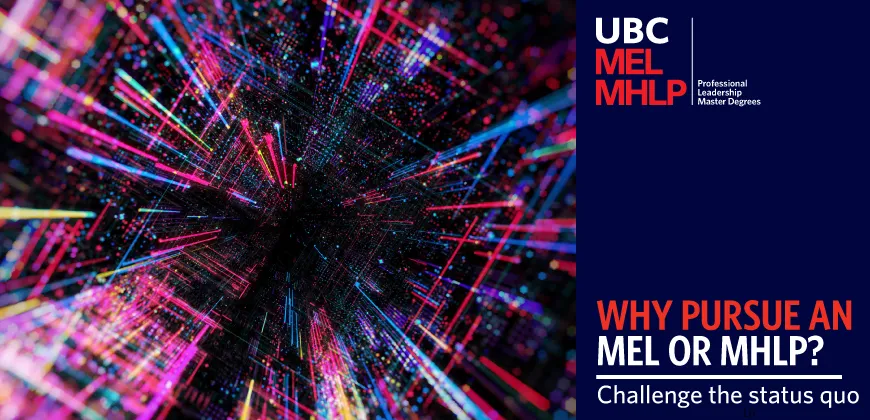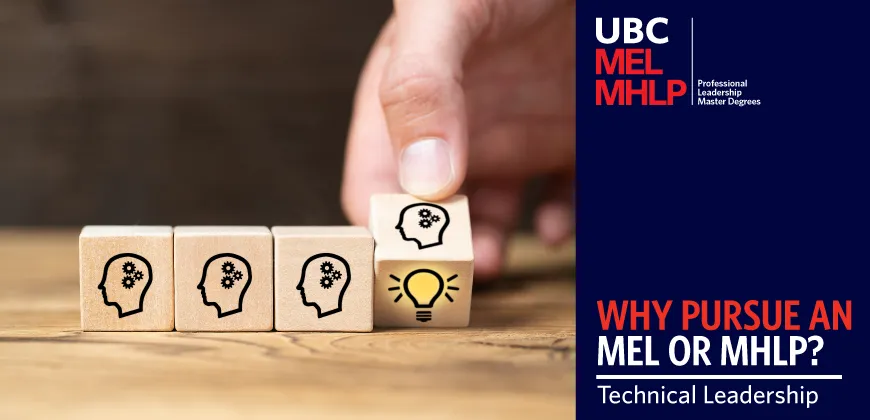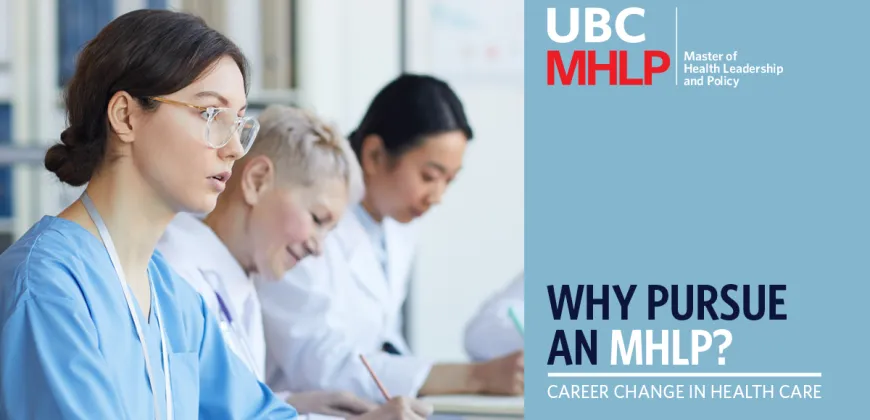Challenge the status quo

Climate change, dwindling natural resources, extreme weather events, rapid urbanization, poverty, inequitable access to health care… the list of existential crises facing our world is overwhelming. Business as usual is simply not sustainable. Imagining and implementing new ways of doing things is difficult and complex.
More than ever, we need leaders who understand the deep challenges faced by their industry sector and who have the knowledge of business, leadership and policy needed to build a better future.
You may already have a strong value-driven purpose and are committed to making a difference in your industry, whether that’s through designing healthier buildings or cities, advancing renewable energy options or developing innovations in patient-centred care. Gaining the skills you’ll need to realize that purpose is the next step. Graduate degrees like UBC’s Master of Engineering Leadership (MEL) and Master of Health Leadership and Policy (MHLP) are designed specifically for professionals with industry experience and can help you develop the competencies you’ll need to lead transformative projects.
These degrees offer programs in eight sector-specific areas – from Clean Energy Engineering to Sustainable Process Engineering and from Clinical Education to Seniors Care – with a combination of leadership and business as well as technical courses within your chosen field.
The result is a degree that equips you to disrupt the status quo in the industry and be part of transformational change.
Gain the knowledge you need to make an impact
Challenging the status quo requires leaders with knowledge, vision and sense of purpose. As Cheryl Segaric, Director of the MHLP in Clinical Education and Seniors Care, stated in an article on the need for leaders to guide the transformation of health care, it requires “professionals who can advocate and guide for policy changes, lead in education and practice, and create positive workplace cultures where people are able to adapt to and thrive in new ways of working.” Her viewpoint is echoed by Alan Russell, a professor emeritus who teaches in the MEL in Urban Systems.
He says that our world requires changes that depend on leaders with “the broad view of the general practitioner and the detailed understanding of a specialist.”
Manufacturing materials for a more sustainable world
Felipe Blanco and Sangeeth Karuppiah met each other in the MEL in Advanced Materials Manufacturing program in 2021. Felipe had worked as a mining engineer and Sangeeth as an automotive engineer. Both knew that they wanted to use their engineering skills to develop a commercially viable product that would contribute to a more sustainable world. They focused on mine tailings, which have traditionally been viewed as waste, yet contain many rare earth elements in high demand in green applications, like electric vehicles and wind turbines.
Felipe and Sangeeth developed a prototype that shows it is possible to use additive manufacturing to produce permanent magnets. They then developed their idea through the Technology Entrepreneurship business class and launched GreenAge Materials to advance and commercialize their innovative process.
As Felipe explains, “This idea is exciting because it is using clean technologies for a new concept. It takes a free raw material considered waste, reducing the negative impacts for the mining industry, while offering greener products with a lower carbon footprint for the electric vehicle and wind turbine markets.” (Read more about their venture to upcycle tailings to produce value-added products.)
Accelerating sustainable engineering
Raphael Soldi had a similar experience. He had worked as a process engineer for many years in the mining and petrochemical industry but knew he wanted to use his talents to accelerate the global shift to sustainable engineering. “I want to make a difference in the world, to be able to say that as an engineer I contributed to positive change,” he says.
“The Master of Engineering Leadership in Sustainable Process Engineering at UBC aligned with these goals, complementing my professional experience in chemical engineering and giving me a foundation from which to launch my career ambitions.”
In the last month of the program, while finishing up final projects and preparing for exams, Raphael flew to Amsterdam for an interview with a specialized consulting company that focuses on sustainable engineering. He’s now living in Delft where he is working with a client to develop waste-to-chemicals technology, creating a “circular system that reduces waste and eliminates the need to mine raw materials.”
Making an impact in seniors care
Students in the MHLP have also used the degree to develop the skills they need to work for much-needed change in the healthcare sector. Margaret Lin, for example, an alumna of the Seniors Care program, wanted to gain the knowledge needed to have an impact beyond an individual patient. “I enjoyed working with patients and colleagues as a bedside nurse, but I often wished there was more I could do to have a bigger impact,” she says. “As a frontline worker, I realized there were problems I couldn’t address because they are systemic or required innovative approaches beyond my knowledge.”
After broadening her sector-specific knowledge of seniors care and expanding her skills in leadership, business and policy, she’s now in a position of influence where she is developing strategies and tools for healthcare professionals that will have a far-reaching impact on seniors health.
Leadership skills to solve global challenges
Entrepreneur Kees Kruythoff argues in an article in Forbes magazine that sector leadership is pivotal to solving global challenges and that “the world needs an inspiring new wave of leaders.” His advice for those who are already heading up their own organizations or who aspire to be leaders in their fields is to the point:
“surround yourself with a community of supporters, define your uniqueness, and start small, think big and act fast, keeping your mission at the heart of all you do.”
The MEL and MHLP degree offer a proven pathway to follow this advice. You’ll have opportunities to expand your network and connect with a community of supporters. The comprehensive curriculum encourages you to “think big” and the professional development offerings support you to focus on your mission.
At the end of the program, you’ll have gained new sector-specific knowledge – along with an understanding of policy, business and leadership – enabling you to use your skills to challenge the status quo and build a better future.


